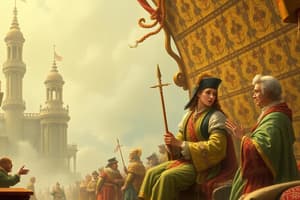Podcast
Questions and Answers
What economic policies are primarily associated with Ronald Reagan's presidency?
What economic policies are primarily associated with Ronald Reagan's presidency?
- Universal basic income and social welfare
- Tax cuts and deregulation (correct)
- Nationalization of key industries
- Increased government spending and regulation
Which event directly led to the passage of the Patriot Act?
Which event directly led to the passage of the Patriot Act?
- The September 11 attacks (correct)
- The Gulf War
- The Watergate scandal
- The Vietnam War
What was a key outcome of the Supreme Court case Brown v. Board of Education?
What was a key outcome of the Supreme Court case Brown v. Board of Education?
- Legalization of interracial marriage
- Affirmation of school prayer
- Declaration of racial segregation in public schools as unconstitutional (correct)
- Establishment of affirmative action programs
Which of the following events is associated with a protest against British taxation in America?
Which of the following events is associated with a protest against British taxation in America?
What major global alliance was formed in 1949?
What major global alliance was formed in 1949?
Which act aimed to provide settlement land in the United States during the 19th century?
Which act aimed to provide settlement land in the United States during the 19th century?
What cultural movement flourished in Harlem during the 1920s?
What cultural movement flourished in Harlem during the 1920s?
What major Supreme Court case legalized abortion nationwide in 1973?
What major Supreme Court case legalized abortion nationwide in 1973?
What was the main purpose of the Emancipation Proclamation?
What was the main purpose of the Emancipation Proclamation?
Which event marks the beginning of the conflict known as the Civil War?
Which event marks the beginning of the conflict known as the Civil War?
What is the significance of the Bill of Rights?
What is the significance of the Bill of Rights?
What period does the term 'Gilded Age' refer to?
What period does the term 'Gilded Age' refer to?
Which of the following best describes the New Deal?
Which of the following best describes the New Deal?
What was a primary goal of the Civil Rights Movement?
What was a primary goal of the Civil Rights Movement?
What does 'Manifest Destiny' refer to?
What does 'Manifest Destiny' refer to?
Which event is associated with the term 'McCarthyism'?
Which event is associated with the term 'McCarthyism'?
Flashcards are hidden until you start studying
Study Notes
Revolutionary War and Founding Documents
- Revolutionary War: The struggle for American independence from Britain lasted from 1775 to 1783.
- Constitution: Adopted in 1787, it serves as the supreme law of the United States.
- Bill of Rights: Comprising the first ten amendments to the Constitution, it guarantees individual liberties.
Civil War and Social Changes
- Civil War: The conflict from 1861 to 1865 between Northern and Southern states over issues like slavery.
- Emancipation Proclamation: The 1863 executive order by President Abraham Lincoln freeing slaves in Confederate territories.
- Brown v. Board of Education (1954): Landmark Supreme Court case declaring racial segregation in public schools unconstitutional.
Economic Transformations
- Industrial Revolution: A period of significant industrial growth during the late 18th and early 19th centuries, transforming economies worldwide.
- Great Depression: A severe global economic downturn that occurred during the 1930s.
- New Deal: Series of reforms and programs initiated by President Franklin D. Roosevelt in response to the Great Depression.
Wars and Global Conflicts
- World War II: A global conflict from 1939 to 1945 that involved most of the world's nations.
- Cold War: Period marked by political tension and military rivalry between the US and the Soviet Union, starting after WWII.
- Vietnam War: Conflict from 1955 to 1975, where the US supported South Vietnam against communist North Vietnam.
Social Movements and Cultural Changes
- Civil Rights Movement: The struggle for justice and equality for African Americans in the 1950s and 1960s.
- Harlem Renaissance: A cultural explosion in Harlem during the 1920s, showcasing African American art, literature, and music.
- Seneca Falls Convention (1848): The first women's rights convention in the US, marking the beginning of the women’s suffrage movement.
Major Legislation and Policies
- Monroe Doctrine: The 1823 policy opposing European interference in the Americas.
- Prohibition: The national ban on alcohol production and sales from 1920 to 1933.
- Affordable Care Act (2010): Health care reform aimed at expanding insurance coverage in the US.
Significant Events and Concepts
- Boston Tea Party: A 1773 protest against British taxation where colonists dumped tea into Boston Harbor.
- D-Day: The June 6, 1944, Allied invasion of Normandy, pivotal in WWII’s European campaign.
- 9/11 Attacks: Terrorist attacks on September 11, 2001, targeting the World Trade Center and the Pentagon.
Contemporary Issues and Policies
- Patriot Act (2001): Law expanding US law enforcement's powers for surveillance and investigations post-9/11.
- Reaganomics: Economic policies under President Ronald Reagan focusing on tax cuts and deregulation.
- Great Society: Domestic programs launched by President Lyndon B. Johnson aimed at eradicating poverty and promoting racial equality.
Historical Challenges and Controversies
- Watergate Scandal: Political scandal leading to President Nixon's resignation in 1974.
- McCarthyism: The practice of making unfounded accusations of treason during the 1950s.
- Dust Bowl: A period characterized by severe dust storms and drought in the Great Plains during the 1930s.
International Agreements and Alliances
- NATO: The North Atlantic Treaty Organization, a military alliance established in 1949.
- NAFTA: The North American Free Trade Agreement, a 1994 treaty aimed at facilitating trade between the US, Canada, and Mexico.
Rights and Legislation Context
- Suffrage: The right to vote in political elections, a crucial aspect of democratic engagement.
- Jim Crow Laws: State and local laws enforcing racial segregation in the Southern US after the Reconstruction era.
- Social Security Act (1935): A law creating a social insurance program for old-age benefits and unemployment insurance.
Historical Narratives
- Trail of Tears: The forced relocation of Native American nations from their ancestral lands to designated Indian Territory in the 1830s.
- Gettysburg Address: The 1863 speech by President Lincoln dedicating a cemetery at the Civil War battlefield, emphasizing national unity.
- Freedom Riders: Civil rights activists who rode interstate buses into the segregated South in 1961 to challenge segregation laws.
Studying That Suits You
Use AI to generate personalized quizzes and flashcards to suit your learning preferences.




